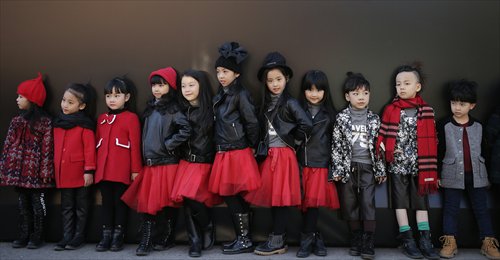One-child policy lifted, all couples allowed two children
Willingness to have more children surprisingly low, experts call for incentives

Models for the children's wear fashion show stand outside the venue during China Fashion Week in Beijing, on Thursday. China announced Thursday that it will start allowing all couples to have two children, abolishing its decades-long one-child policy for urban families. Photo: AP
China will further ease its family planning policy and allow all couples to have two children in order to deal with an aging population, the Communist Party of China (CPC) announced on Thursday at the end of a four-day plenary session in Beijing.
The major move comes after years of public cries to end the so-called one-child policy that was introduced in cities in the 1970s, aimed at controlling the surging population. Experts are expecting further loosening of the restrictions, citing a pending population crisis caused by constant low birth rate.
China will "fully implement a policy of allowing each couple to have two children as an active response to an ageing population," the CPC said in a communiqué after the fifth plenum of the 18th CPC Central Committee.
The statement also stressed that the nation will uphold its family planning policy, improve its population strategy and strive for balanced demographic development.
Li Bin, head of the National Health and Family Planning Commission, said the policy change is a practical move in accordance with the population growth change.
"The situation has seen profound changes. Having fewer children and giving them a better growing environment has become a mainstream belief of society," Li said Thursday. He added that the new policy will help optimize the nation's democratic structure, increase the supply of laborers and boost sustainable economic development.
In earlier years, China's family planning policy limited most urban couples to one child and most rural couples to two children, if the firstborn child was a girl. The policy was later relaxed to allow parents to have a second child if they were both only children. The one-child policy was further loosened in 2013, which allowed couples to have two children if one of them is an only child.
The country's population grew from 600 million in the 1950s to 800 million in 1970, and is now close to 1.4 billion.
The government admitted that the willingness to have more children was not as high as some have feared. There were 10 million couples eligible to have a second child, but only 1 million did so in 2014, according to media reports.
Huang Wenzheng, a former Harvard University assistant professor and an expert on population, said the new policy announced Thursday is a plausible major move, but it is far from enough to solve the population issue.
"The extremely low fertility rate and the excessive aging of the population are irreversible in the near future," Huang told the Global Times, adding that there may be a temporary surge in population in a year or so, with 5 million babies born in one year, but then the growth will drastically dwindle.
Chinese experts agree that the country's fertility rate lingered at around 1.5 children per woman of childbearing age in the past few years, far lower than the 2.2 rate believed to be healthy for China.
Li Jianmin, a professor at the Population Development Research Institute of Nankai University, said if the birth rate stayed low for one or two decades, it would seriously hurt the country's economic and social development. He suggests the government now focus on improving services in employment, health care and education, so as to clear the hurdles that hamper people's willingness to have more children.